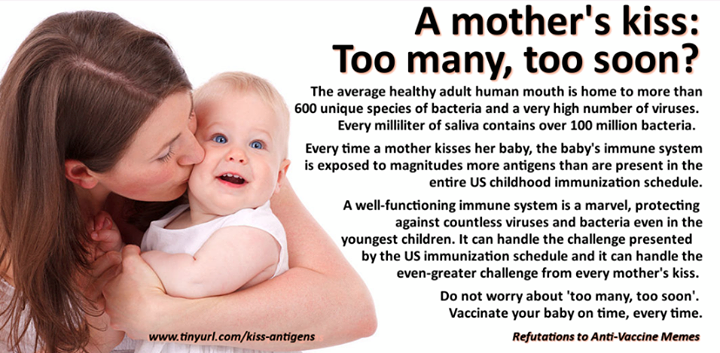When I bring this point up, I'll get the skeptic asking for specific reference of an infant not producing anti-bodies sufficiently. Honestly, I don't have it, it's my own logic.In other words, another example of the "common sense fallacy", or the arrogance of ignorance.
 |
| Image description: traffic-type sign reading "I stick to my opinion. Please do not confuse me with FACTS" |
To that I say,
 |
| Image description: traffic-type sign reading "Everyone is entitled to their own opinions. They are not entitled to their own facts." |
The chiropractor goes on to write,
In the same breath, if I ask them to produce specific reference for an infant that can produce anti-bodies sufficiently, they cannot produce that evidence either. Pro-vaccinators can't attack the vaccine choice crowd as unscientific with arguments that are unscientific.
Let us take just one example (in addition to the copious sources below),
Neonatal immunization: where do we stand?
PURPOSE OF REVIEW:
Recognition of the high burden of disease in early life and advances in the understanding of neonatal immunology have resulted in renewed interest in maternal and neonatal vaccination. This article reviews existing information and recent advances in neonatal human immunization.
RECENT FINDINGS:
Recent findings have demonstrated the neonatal immune system not to be immature but rather specifically adapted for early postnatal life. This includes the preferential induction of memory B cell rather than antibody-secreting plasma cells and polarization of neonatal T-cell responses away from potentially deleterious T-helper type 1 cytokines. Recent neonatal acellular pertussis and pneumococcal conjugate vaccine trials have proven that a birth dose of acellular pertussis and/or pneumococcal vaccine, in limited samples sizes, are well tolerated and immunogenic; however they have identified vaccine interference as a critical issue to address.
SUMMARY:
Neonatal immunization may be a well tolerated and effective preventive strategy against early life pathogens. Research to better understand how neonatal vaccine responses are elicited and to identify optimal early life adjuvants and formulations may broaden neonatally vaccine-preventable diseases to pertussis, rotavirus and possibly influenza, further reducing disease burden in this vulnerable group. Hurdles to neonatal vaccination include safety concerns, both immunological and clinical, demonstration of vaccine efficacy and public acceptance.
Neonatal immunization: where do we stand?
PURPOSE OF REVIEW:
Recognition of the high burden of disease in early life and advances in the understanding of neonatal immunology have resulted in renewed interest in maternal and neonatal vaccination. This article reviews existing information and recent advances in neonatal human immunization.
RECENT FINDINGS:
Recent findings have demonstrated the neonatal immune system not to be immature but rather specifically adapted for early postnatal life. This includes the preferential induction of memory B cell rather than antibody-secreting plasma cells and polarization of neonatal T-cell responses away from potentially deleterious T-helper type 1 cytokines. Recent neonatal acellular pertussis and pneumococcal conjugate vaccine trials have proven that a birth dose of acellular pertussis and/or pneumococcal vaccine, in limited samples sizes, are well tolerated and immunogenic; however they have identified vaccine interference as a critical issue to address.
SUMMARY:
Neonatal immunization may be a well tolerated and effective preventive strategy against early life pathogens. Research to better understand how neonatal vaccine responses are elicited and to identify optimal early life adjuvants and formulations may broaden neonatally vaccine-preventable diseases to pertussis, rotavirus and possibly influenza, further reducing disease burden in this vulnerable group. Hurdles to neonatal vaccination include safety concerns, both immunological and clinical, demonstration of vaccine efficacy and public acceptance.
 |
| Neil deGrasse Tyson: "The good thing about science is that it's true whether or not you believe in it" |
Summary:
The chiropractor has counter-factual opinions about the evidence for the robustness of the infant immune system. His claims are in fact unscientific.
Additional Sources on the Neonatal and Infant Immune System:
Catani A, Pediatric Allergy, Asthma and Immunology Springer; 2008 edition
Chatterjee , O'Keefe C Current Controversies in the USA Regarding Vaccine Safety Expert Rev Vaccines. 2010;9(5):497-502. http://www.medscape.com/viewarticle/722174_6
Cohn, M. and Langman, R. E. (1990), The Protection: The Unit of Humoral Immunity... Selected by Evolution. Immunological Reviews, 115: 7–147. doi: 10.1111/j.1600-065X.1990.tb00783.xhttp://onlinelibrary.wiley.com/doi/10.1111/j.1600-065X.1990.tb00783.x/abstract
Fadel S, Sarazotti M. Cellular immune responses in neonates. Int Rev Immunol.2000;19 :173– 193 http://www.ncbi.nlm.nih.gov/pubmed/10763708?dopt=Abstract
Offit PA, Quarles J, Gerber MA, Hackett CJ, Marcuse EK, Kollman TR, Gellin BG, and Landry S, (2002) Addressing Parents’ Concerns: Do Multiple Vaccines Overwhelm or Weaken the Infant’s Immune System? Pediatrics Vol. 109 No. 1 January 1, 2002
pp. 124 -129 (doi: 10.1542/peds.109.1.124) http://pediatrics.aappublications.org/content/109/1/124.full
Siegrist CA. Neonatal and early life vaccinology. Vaccine.2001;19 :3331– 3346 http://www.ncbi.nlm.nih.gov/pubmed/11348697
Wood N, Siegrist CA. Neonatal immunization: where do we stand? Curr Opin Infect Dis. 2011 Jun;24(3):190-5. doi: 10.1097/QCO.0b013e328345d563. http://www.ncbi.nlm.nih.gov/pubmed/21415741
Screen Capture of Chiropractor's Claims
 | |
|












